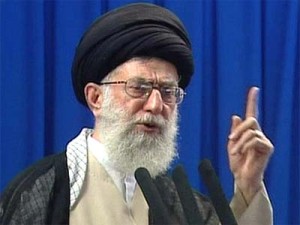Iranian Supreme Leader Ayatollah Ali Khamenei said today that he had set a “red line” for the negotiations his country is restarting with Western countries over Iran’s nuclear program. His remarks echo similar comments Iranian officials in recent weeks concerning Iran’s “right” to create nuclear fuel through uranium enrichment. The U.S. and its allies are hoping that offering Iran a strong incentive, namely the easing of crippling sanctions to its economy, would bring Iran around to the point that it would agree to forego uranium enrichment. The strong language from the leaders in Iran indicates otherwise. While many observers might point to national pride or fervent nationalism as the explanation, a recent piece in the NY Times explains the Iranian recalcitrance by citing it as an example of the power of “sacred values”, defined as “moral imperatives we’re unwilling to compromise on, be they political, religious or personal”. Evidently for Iranians nuclear power has become such a sacred value and no amount of logical persuasion or financial incentives is likely to have any effect.
The U.S. is no stranger to the strength of sacred values, as the battles over gun rights and abortion have demonstrated. We may be seeing the playing out of a sacred value among those who are now so vociferously attacking “Obamacare”, who are not just upset over the botched roll-out or the bad policy they believe it represents, but view it as an assault on the strong belief they hold relative to the kind, size and power of the federal government. Clearly when sacred values come into play negotiation and compromise goes out the window. Of course in negotiations the trick is to determine when intransigence is a negotiating posture and when it is due to running up against a sacred value. The article cites pioneering work in behavioral economics that challenges the traditional assumption of economists that people act in their own best interest when it comes to financial transactions. It’s not just that people don’t always recognize their own best interest, in some cases that interest may be clashing with values so deeply held that nothing else matters. The presence of sacred values can be important to recognize not just in political or diplomatic negotiations, but in personal interactions as well. It’s good to know when you might be hitting your head against a brick wall.
